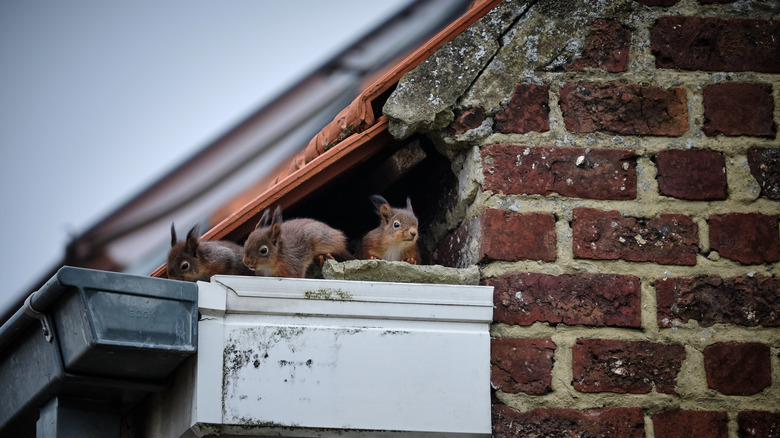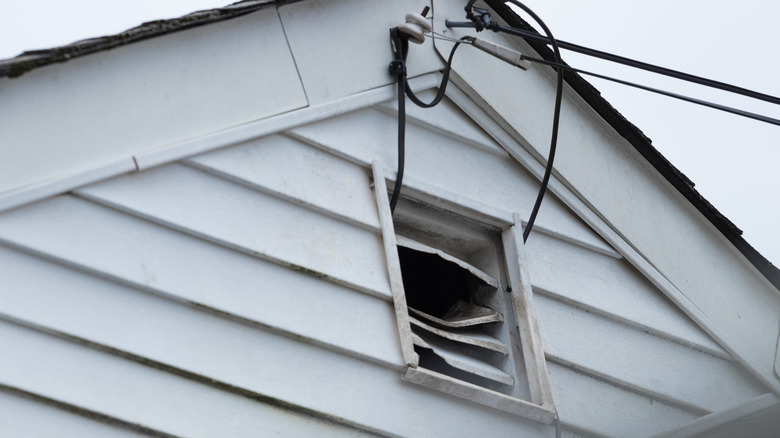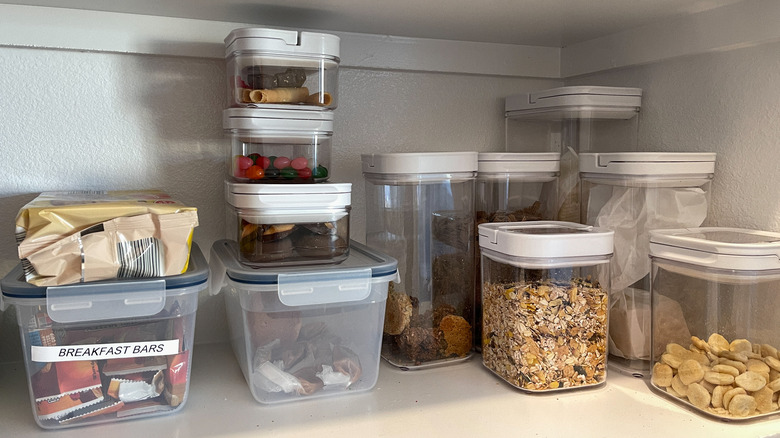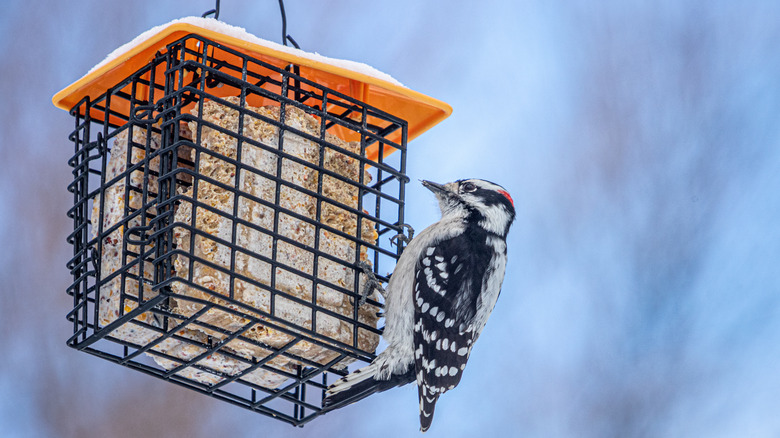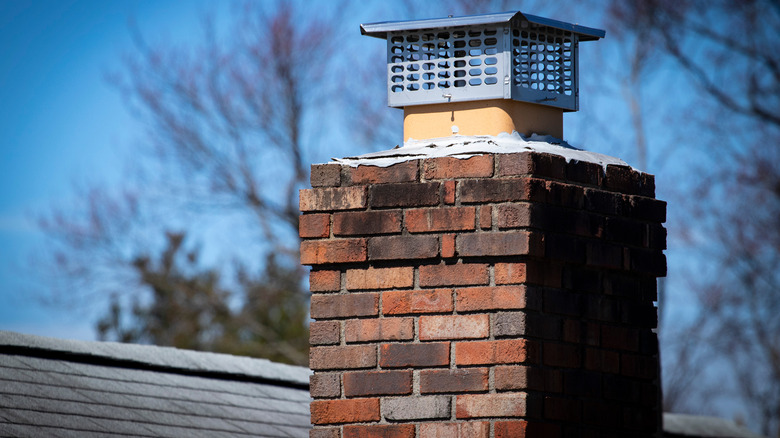The 8 Best Ways To Keep Squirrels Out Of Your Home All Winter Long
When it comes to preparing for the winter, you may not always think about keeping squirrels away. However, as the weather gets colder, it becomes more and more likely that these rodents will try to get into your attic, basement, or storage spaces to nest in a warm place. They crawl in through the smallest of openings and will build nests and reproduce inside your home if you don't catch them soon enough.
Although a squirrel playing in the park might be cute, it's a dangerous animal to have inside. For one, squirrels need to chew constantly. Their teeth don't stop growing, so they can cause a lot of damage to your furniture, siding, and even the wooden foundations of your house. Plus, they may chew on wires, which can lead to electrical fires. As if that isn't reason enough to keep squirrels outside this winter, they can also carry diseases such as typhus, ringworm, and even the plague. They may also bring fleas and ticks inside with them, which can carry a whole host of other diseases and problems. The good news is, there are some ways to squirrel-proof your home all winter long.
1. Check the exterior of your home for entry points
Squirrels don't usually come into your house through the front door. Instead, they will find small entry points along the eaves of the roof, through open vents, or even down the chimney. Rodents are very good at squeezing into tight spaces, and squirrels can actually fit into a 1.5 inch hole. All it takes is one tiny open space, and you could be dealing with a squirrel in your attic.
The best way to keep them out, then, is to walk around the exterior of your home and check for any vulnerable spots. Make sure that your vents are covered and that there are no holes or cracks in your siding. Because squirrels often come in through the roof, you may want to use a ladder to more thoroughly inspect the eaves and roofing for entry points. If you find any holes, make sure to get them fixed as soon as possible before you let in any uninvited guests.
2. Check often for signs of intrusion
If you want a rodent-free home this season, you'll need to be active in prevention. You'll also need to act quickly if a squirrel does happen to get inside. You'll be able to see signs of their presence if you check often. Look for teeth marks along the baseboards or on furniture. Check for droppings or a bad smell. Inspect soft storage items and furniture for evidence of a nest. And, finally, listen carefully for their little feet scurrying over your ceilings or inside your walls.
In order to get one of these intruders out as quickly as possible, you'll need to first find it. By doing weekly inspections of your attic, basement, and other infrequently used spaces, you'll be able to quickly spot the signs. Then you can move forward with getting the squirrel back outside. Another way to confirm whether you have an unwanted visitor is to sprinkle a little flour on the floor of your attic. You'll see paw prints if you do have a squirrel inside, and you may be able to follow them to find the entry point said animal has been using.
3. Don't leave any food sitting out
Besides warmth, the main thing that will attract squirrels is food. If they find a good food source, they will stick around. These critters are omnivores, meaning they eat both plants and animals. They might be attracted to fruits, grains, sugars, and even pet food. The more food they find, the more likely they are to come back looking for more. And of course, once inside, they can be difficult to get back out.
In order to avoid attracting them in the first place, it's important not to leave any food out. This means putting away pet food, wiping down counters, storing food in airtight containers, and washing all the dishes before you go to bed. It also means making sure your trash bins, both inside and outside, are sealed and inaccessible. By keeping your kitchen clean and making sure there is no food elsewhere in the house, you make your home much less inviting to the neighborhood vermin.
4. Make your bird feeders hard to reach
Food doesn't have to be in the kitchen to attract pests. Even providing food for the squirrels outside can bring them closer to your home and make them more likely to come inside. Bird feeders are actually a major attractor for them. Once they start to feast in your backyard, they are more likely to try to get into the house to see if there is more food around.
There are a lot of hacks out there for keeping squirrels off your birdfeeder. Some, like wiping oil on your feeder, can cause more harm than good. One hack that does work is to mix some spicy chilis with water in a spray bottle as a DIY squirrel repellent. The capsaicin can deter squirrels but doesn't hurt the birds. You can also look for specific feeders that are designed to repel rodents while allowing your favorite birds to continue eating.
5. Practice proper storage methods
As mentioned already, squirrels often come into homes in order to find a warm place to build a nest. Therefore, an important part of keeping them away is to make sure you are not providing easy nesting opportunities. One of the biggest mistakes you can make this winter is to leave soft fabrics, clothing, or plush furniture stored out in the open in your attic. Soft materials provide a great nesting opportunity, and an unused sofa in an empty room might be filled with babies come spring.
Instead of leaving furniture accessible, cover large items with plastic tarps. For any fabric or clothing, store them in airtight plastic boxes. This will also help protect them from dust, moisture, and other pests. Another way to protect items in storage is to routinely come through and shine a bright light or turn on a strobe light. This sudden flash can scare away any squirrels that might have wandered in and will deter them from building nests.
6. Install a chimney cover
Aside from holes in the siding and broken roofing, one of the more common entry points for squirrels is through vents and chimneys. If these aren't protected, they make open entryways for vermin to crawl through to get into your warm home during the winter months. It's important to check your covers frequently, since rodents can chew through some materials. Plus, older screens can be pulled off or bent out of the way, allowing easy access.
When installing new screens on your chimneys and vents, it's important to choose materials that squirrels can't chew through. This can include stainless steel mesh, sheet metal, and aluminum. Make sure the screens are tightly secured with no gaps around the edges, and check them every year for damage. It's also a good idea to check the screens around your vents a couple times a year to make sure they aren't causing any blockages.
7. Trim tree branches near your roof
If there are openings around the eaves of your house, squirrels still need roof access in order to get in. Some squirrels can actually make leaps of up to 9 feet! That means that tree branch near your home poses a significant risk in terms of invasion by these furry critters. If they can easily get onto your rooftop, then they can comfortably explore until they find an opening.
Although these furry invaders can jump further, you really only need to create a perimeter that is about 5 feet across around your home. If you trim your branches so that none of them are within this distance, you will be less likely to find one of these animals in your attic. Plus, an added bonus of trimming branches or removing trees is that it will also diminish the number or bugs you get inside!
8. Scare them away from your garden
The best way to keep unwanted critters out of your house is by also keeping them out of your yard. If they don't have the chance to look for an entry into your home, then you're less likely to have any problems. While it may seem fine to have squirrels running through your garden, in reality, this just means that they have more opportunity to find ways into your house. It's best to keep your entire property free of these intruders.
In order to keep them away, you can use a few different tactics to try and spook them. This will lead them to seek shelter and food elsewhere, but it won't cause any harm. One thing you can do is place pinwheels around your garden. The movement and flashes of color can scare off the vermin. Another way to trick them into leaving your home alone is to make it appear that your yard is full of predators. You can do this by placing dog fur around the outside or by using a statue of a predator, like an owl, hawk, or other large bird.
